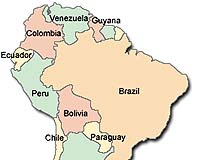| . |  |
. |
Toronto (AFP) June 27, 2010 Chinese President Hu Jintao slammed protectionism on Sunday and urged his G20 partners to ensure exit strategies from economic stimulus programs will not harm global recovery. Speaking at a G20 summit in Toronto, Hu took aim at the developed world, saying it should promote international trade with greater openness. "We must take concrete actions to reject all forms of protectionism, and unequivocally advocate and support free trade," Hu told his counterparts from the G20 group of major developed and emerging economies. He called for a renewal of commitments from countries not to impose new restrictions on goods, investment and services, and urged his partners to "earnestly follow through" on these pledges. Amid warnings from American legislators seeking to impose trade sanctions on China over its relatively undervalued yuan currency, Hu said trade disputes should be settled through consultation. "It is important to address trade frictions appropriately through dialogue and consultation and under the principle of mutual benefit and common development." Hu did not touch on the issue of the yuan's value, but lamented that "exchange rates of major currencies fluctuate drastically and international financial markets suffer from persistent volatility." G20 leaders shied away from naming China, according to a final statement obtained by AFP, instead urging "greater exchange rate flexibility in some emerging markets." A senior Russian diplomat said China had asked fellow powers not to name China in the statement. "Most G20 members welcomed the Chinese government's plan to allow the yuan to fluctuate. This phrase will not figure in the final statement at the request of the Chinese," Kremlin negotiator Andrei Bokarev told reporters. Hu, in his speech, also weighed in on the debate between the United States and countries such as Germany and Britain -- which are seeking rapid deficit reduction -- on how to nurture the fragile global recovery from the worst recession in decades. Despite its mounting deficit, the United States wants stimulus measures to be maintained while Germany and Britain, worried about the escalating budget crisis in Europe, feel deficits needed to be trimmed swiftly. Hu said: "We must act in a cautious and appropriate way concerning the timing, pace and intensity of an exit from the economic stimulus packages and consolidate the momentum of recovery of the world economy." Hu also wanted a shift in the focus of the G20, the premier global economic forum, from coordinating stimulus measures to coordinating growth, and from addressing short-term contingencies to promoting long term governance. "We should strengthen coordinating of macroeconomic policies among G20 members, keep the right intensity of our policies and support countries hit by the sovereign debt crisis in overcoming the current difficulties," he said. The sovereign debt turmoil in Europe was triggered by a Greek budget crisis and has threatened to spread across the eurozone, undermining the stability of the euro and the strength of many European banks. On global financial reforms to avoid future economic crises, Hu said regulation of credit rating agencies, for example, should be strengthened. He called for uniform methodologies and standards for sovereign credit ratings so that "rating results can accurately reflect the state of a country's economy and credit worthiness."
Share This Article With Planet Earth
Related Links Global Trade News
 Brazil feels the heat from eurozone woes
Brazil feels the heat from eurozone woesRio De Janeiro (UPI) Jun 24, 2010 Brazil is feeling the heat from the eurozone crisis with the first impact showing up as lower foreign direct investment into the country, Central Bank figures showed. The bank's statistical release this week predicted that contraction in FDI could exceed 15 percent even though Brazil remains on a path of healthy growth and most economic indicators remain sound. Analysts said FDI ... read more |
|
| The content herein, unless otherwise known to be public domain, are Copyright 1995-2010 - SpaceDaily. AFP and UPI Wire Stories are copyright Agence France-Presse and United Press International. ESA Portal Reports are copyright European Space Agency. All NASA sourced material is public domain. Additional copyrights may apply in whole or part to other bona fide parties. Advertising does not imply endorsement,agreement or approval of any opinions, statements or information provided by SpaceDaily on any Web page published or hosted by SpaceDaily. Privacy Statement |